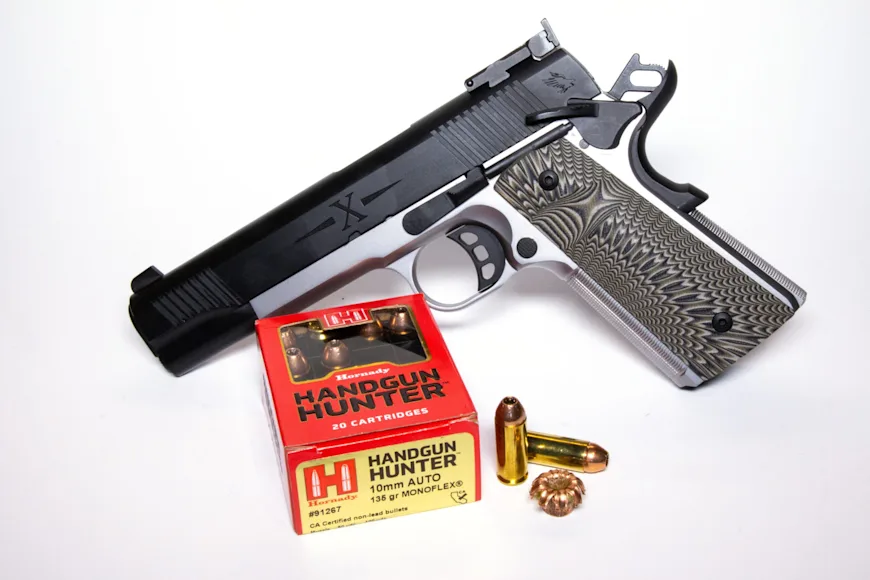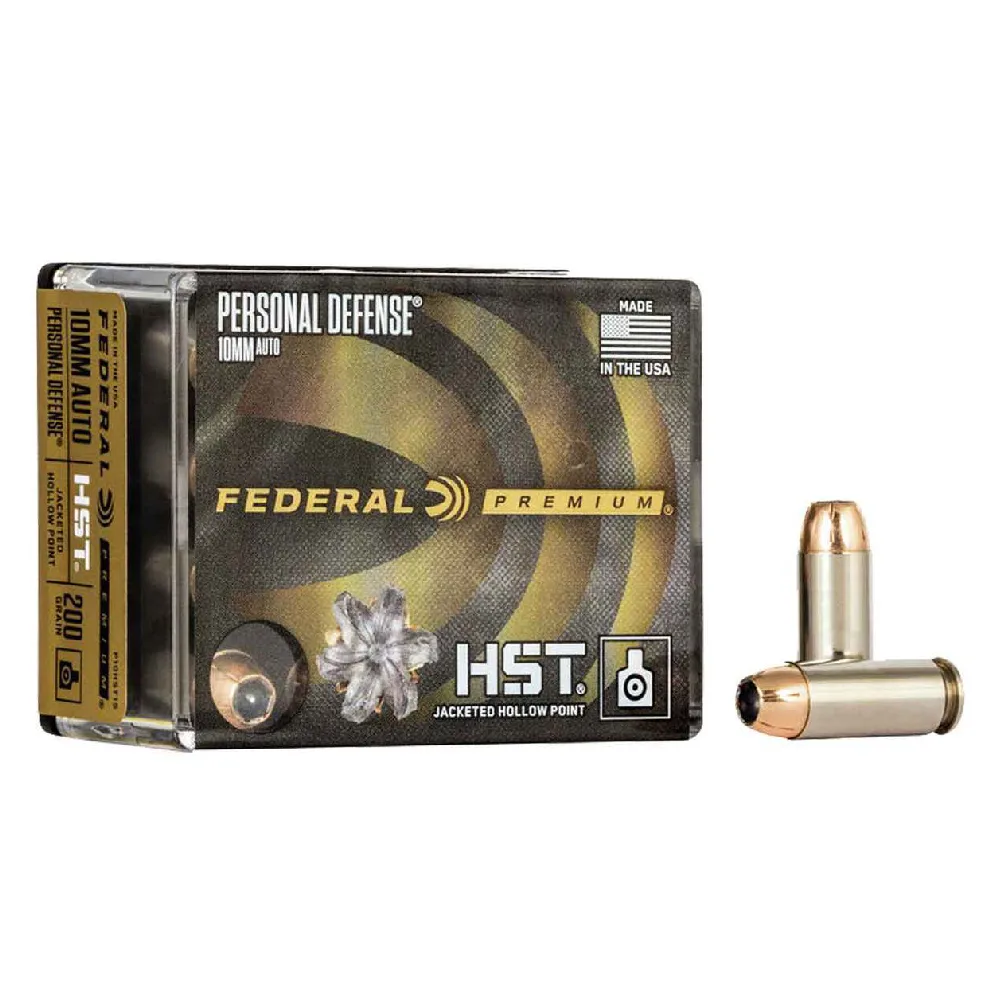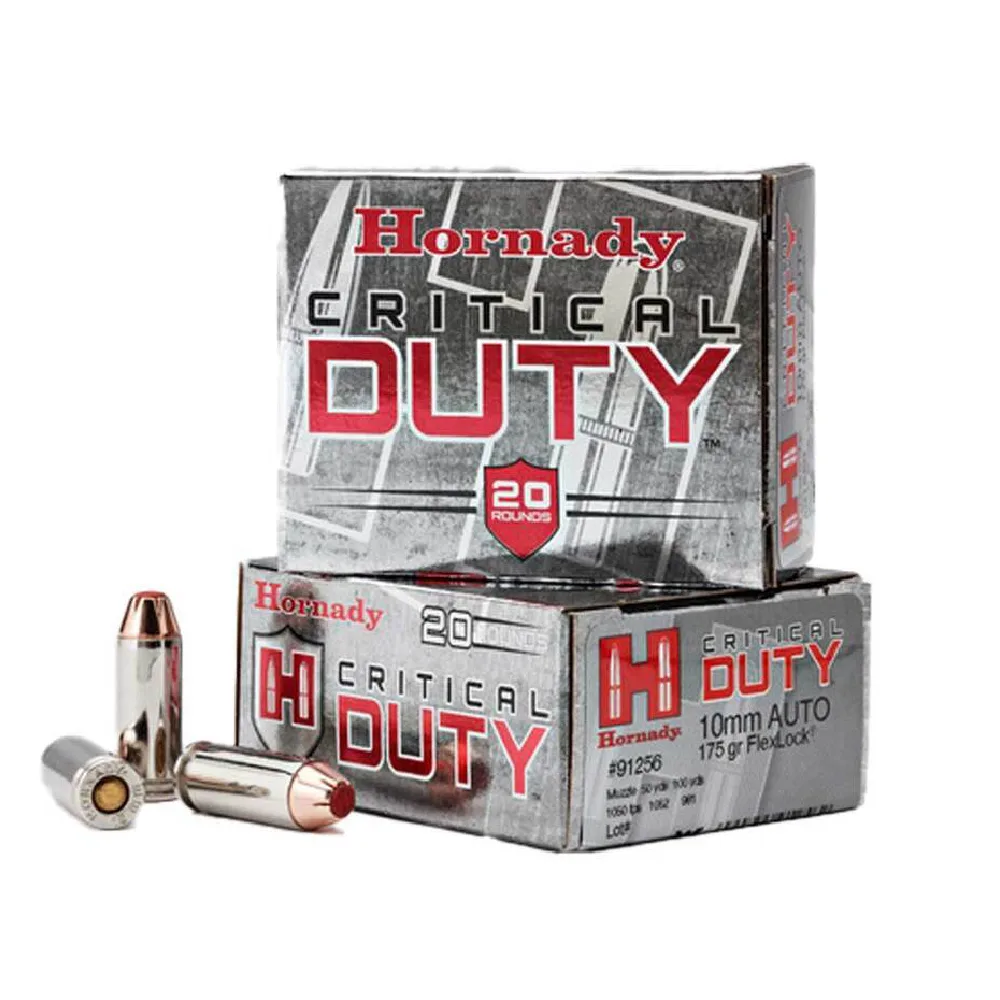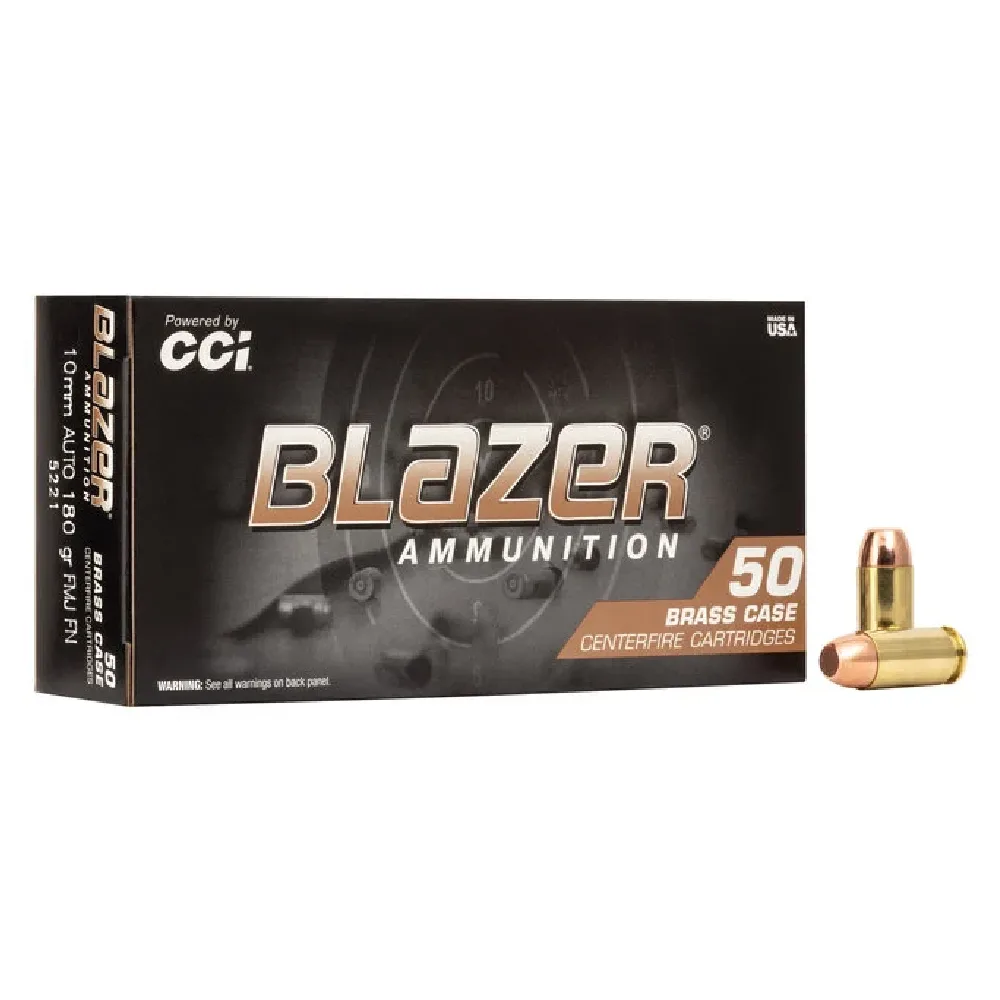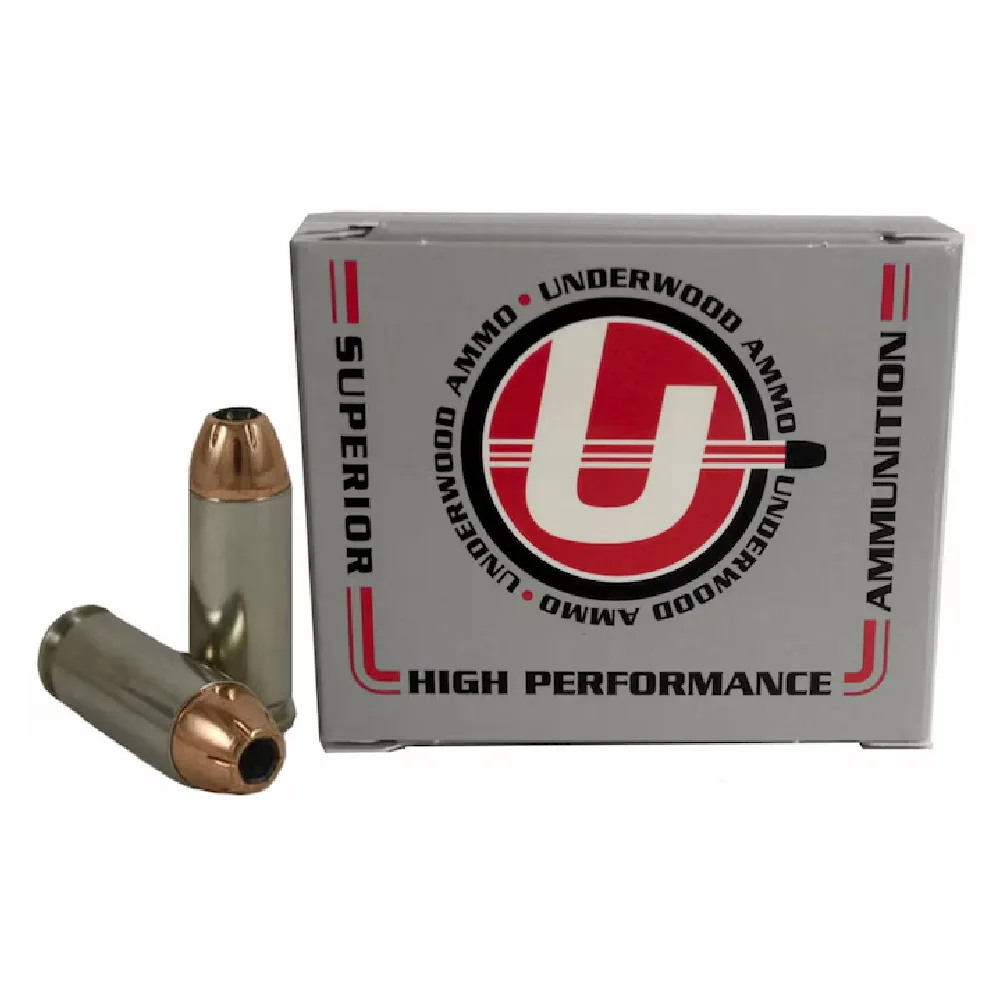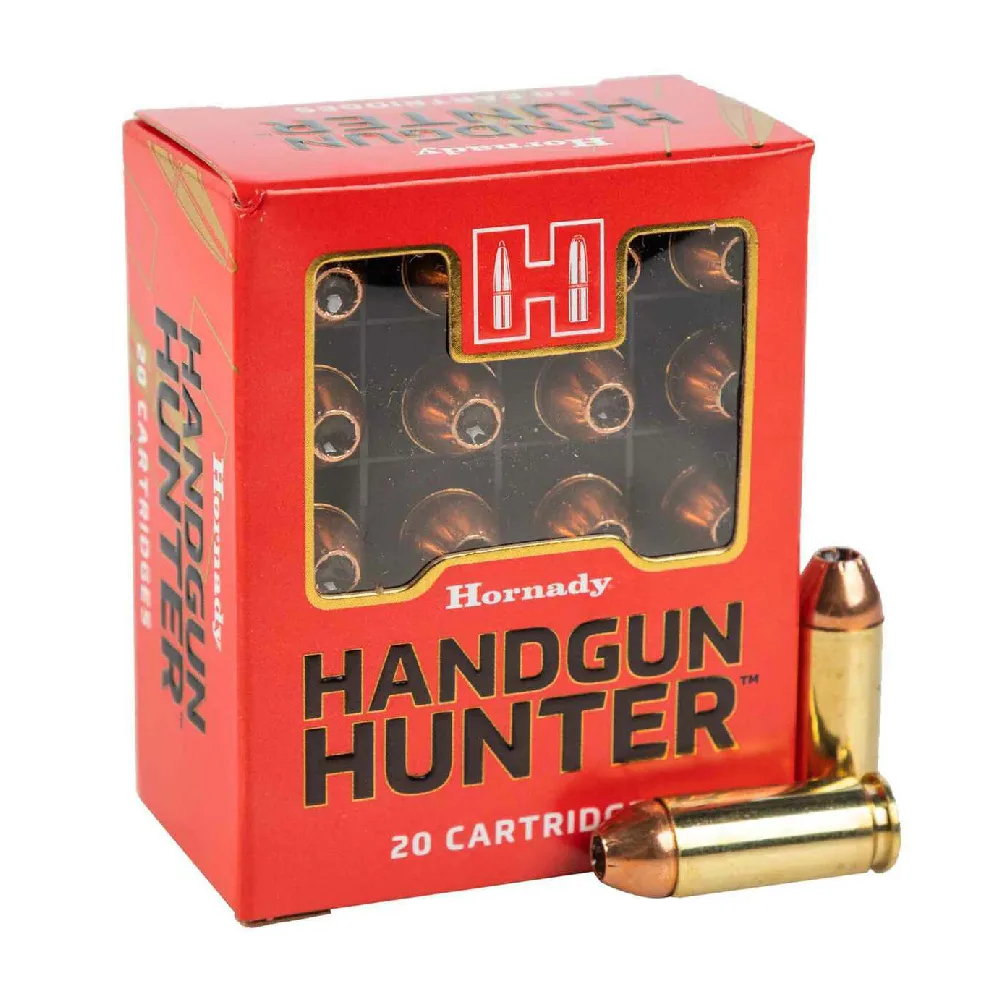We may earn revenue from the products available on this page and participate in affiliate programs. Learn more ›
In the past, there were never many options for 10mm ammo, and picking the best cartridge wasn’t that hard. But things are different today. Just as the 10mm Auto’s little bother—the 40 S&W (short & weak)—is losing its appeal, the interest in the 10mm is on the rise. A major online retailer lists more than fifty 10mm Auto loads to choose from. That, as you can imagine, complicates the process of selecting the right cartridge for the right application. And that’s why I tested various 10mm loads—so you don’t have to go through the trial and error process and fire hundreds of rounds to find the perfect bullet. Here is the best 10mm ammo currently available.
Best Overall: Federal HST
Best for Bear Defense: Buffalo Bore Hard Cast Outdoorsman
Best for Self Defense: Hornady Critical Duty
Best Budget: CCI Blazer FMJ FN
Best Overall: Federal HST
Specs
Bullet Weight: 200 grains
Bullet Type: HST
Velocity: 1121 fps
Energy: 558 foot-pounds
Penetration: 15.0 inches
Recovered Bullet Diameter: 0.702-inch
Recovered Bullet Weight: 200 grains
Pros
Ideal penetration
Wide bullet upset
Cons
Expensive
Given the velocity and energy of the 10mm Auto cartridge, you can probably effectively kill a deer with just about any 10mm load if you place the shot properly. But ideally, a deer hunter wants a load that is accurate, hits hard, penetrates deeper than 12 inches, and deforms with a wide frontal diameter to damage a lot of tissue. The 200-grain HST load pushed deep, and the bullet upset to nearly three-quarters of an inch in diameter. It was also the most precise shooting load we tested, with five-shot groups averaging less than an inch at 10 yards. It should also work well for personal protection. Of course, for this type of terminal performance, you’ll have to pay, and this was also the most expensive load we considered.
Best for Bear Defense: Buffalo Bore Hard Cast Outdoorsman
Specs
Bullet Weight: 220 grains
Bullet Type: Hardcast
Velocity: 1132 fps
Energy: 626 foot-pounds
Penetration: 36.0+ inches
Recovered Bullet Diameter: 0.420-inch
Recovered Bullet Weight: 220 grains
Pros
Unmatched penetration
Extremely tough bullet
Cons
Heavy recoil
When it comes to using a pistol as a defense against bears—regardless of their size—most agree that penetration is most important. Though you might think a full metal jacket bullet would penetrate the deepest, they don’t. Metal jacket bullets will out-penetrate hollow points, but they often bend or slightly deform when they hit bone, and they also tend to veer off course. The best bullet for penetration out of a handgun is a hardcast bullet. These bullets are rock hard and almost every Outdoorsman load offered by Buffalo Bore has stopped a bear of some kind. This 220-grain load from Buffalo Bore offers high energy and will drive straight through more than three feet into blocks of Clear Ballistics. It averaged right at an inch for five-shot groups at 10 yards and was the third most precise shooting load that we tested.
Best for Self Defense: Hornady Critical Duty
Specs
Bullet Weight: 175 grains
Bullet Type: FlexLock
Velocity: 1136 fps
Energy: 501 foot-pounds
Penetration: 12.0 inches
Recovered Bullet Diameter: 0.599-inch
Recovered Bullet Weight: 173 grains
Pros
Good balance of penetration and bullet upset
Not overly expensive
Cons
Moderate recoil
The Federal HST load already mentioned would work very well for self-defense, but the recoil is a bit stiff—about 10 percent more than this load from Hornady. But even with this load’s lesser energy, it will still penetrate to 12 inches or a bit more, and the bullet will upset with a frontal diameter of nearly 6/10ths of an inch, delivering terminal performance just a tad better than the best 40 S&W loads available. For the five, 5-shot groups fired at 10 yards from the bench, this load came in second, averaging 1.03 inches. These Hornady FlexLock bullets are also very good at defeating intermediate barriers like plywood, wallboard, and auto glass. And while at $1.75 per shot might sound expensive, it’s about average for a good 10mm Auto self-defense load.
Best Budget: CCI Blazer FMJ FN
Specs
Bullet Weight: 180 grains
Bullet Type: FMJ FP
Velocity: 1170 fps
Energy: 547 foot-pounds
Penetration: 18.0+ inches
Recovered Bullet Diameter: 0.419-inch
Recovered Bullet Weight: 180 grains
Pros
Affordable
Reliable
Cons
Best used for paper and steel
If you need practice ammo for your 10mm, you do not want expensive loads—the good stuff already costs an arm and a leg. This 180-grain load from CCI comes in reloadable cases, is reasonably soft shooting, and won’t cause a divorce if you buy several boxes. This load was fired into blocks of Clear Ballistics, but like with many FMJ loads, it did not track perfectly straight, and in some cases, the bullet exited the 6-inch block. This is why FMJ bullets are not the best for bear defense. Given the cost of this ammunition, the average group size for five, 5-shot groups at 10 yards was a respectable 1.31 inches. Do not use in firearms with ported barrels or ported recoil compensators.
Underwood XTP JHP
Specs
Bullet Weight: 180 grains
Bullet Type: Hornady XTP JHP
Velocity: 1302 fps
Energy: 677 foot-pounds
Penetration: 13.0 inches
Recovered Bullet Diameter: 0.622-inch
Recovered Bullet Weight: 166 grains
Pros
High energy
Good balance of penetration and bullet upset
Cons:
Heavy recoil
With nearly 700 foot-pounds of energy, good bullet upset, and consistently more than 12 inches of penetration, this load from Underwood would work well for deer or hog hunting, and it would perform well in the self-defense role. However, all that energy does not come without a cost. This load will recoil 26 percent more than the 200-grain HST load. This is not good if you need fast follow-up shots because a recoil increase of that much can increase the time it takes to recover and fire a second shot by 50 percent or more, depending on the skill of the shooter. Still, this is a wickedly performing load for the 10mm Auto, and it was the second most accurate load we tested, averaging 0.98 inches for five, 5-shot groups from a sandbag rest at 10 yards.
Hornady Handgun Hunter
Specs
Bullet Weight: 135 grains
Bullet Type: Monoflex
Velocity: 1291 fps
Energy: 500 foot-pounds
Penetration: 12.0 inches
Recovered Bullet Diameter: 0.709-inch
Recovered Bullet Weight: 133 grains
Pros
Wide bullet upset
Low recoil for a 10mm
Cons
Shallow to moderate penetration
Two things about this load stood out: The bullets upset with a very wide frontal diameter—wider than any other load tested. And, because the bullet is so lightweight, recoil was the least of any load tested. It’s marketed as a hunting load and with an average penetration depth of 12 inches, it seems a bit shallow for that application. However, it should work well for deer or feral hogs. But this load should also perform well in the self-defense role. The light recoil would make follow-up shots faster, and there would be little, if any, concern about over-penetration. During precision testing, it averaged 1.34 inches. This is the only load that had a reliability issue. One empty failed to eject, and this was probably due to its light recoil. But a lighter recoil spring should probably correct this.
Federal Solid Core
Specs
Bullet Weight: 200 grains
Bullet Type: Syntech-coated hardcast
Velocity: 1191 fps
Energy: 630 foot-pounds
Penetration: 36 + inches
Recovered Bullet Diameter: 0.508-inch
Recovered Bullet Weight: 199 grains
Pros
Deep penetration
High energy
Cons
Stiff recoil
This is another hardcast load for the 10mm, but based on our tests, the bullets did not seem quite as hard as those used by Buffalo Bore. There was a minimal amount of bullet upset in the blocks of Clear Ballistics. Though we recovered all the deep penetrating bullets after 36 inches by using a panel of body armor, the minimal upset would suggest this bullet might not fare as well against bone and that it would likely penetrate slightly less than Buffalo Bore’s 220-grain. Still, it’s a good option to consider due to ease of feeding reliability with its partially truncated nose and Syntech coating. If you want a bear defense load, and if your 10mm pistol has trouble feeding the Buffalo Bore hardcast bullet with its wider meplat, give this one a try. It averaged 1.27 inches for five, 5-shot groups at 10 yards from the bench.
How We Tested 10mm Ammo
I’ve been conducting terminal performance testing for more than 30 years, and I’ve used every test medium, from 10 percent ordnance gelatin to a special wax-based, during that time. As a result, I’ve developed a large catalog of data, and while it might not include all the 10mm Auto ammunition you can currently buy, it includes most of them. There are a lot of loads that offer near-identical performance, so not all are listed. Those that are listed were tested extensively out of a Tisas 1911 pistol in the following categories.
Reliability: How reliable did the ammunition feed, cycle, and fire in the test gun?
Terminal Performance: How deep did the bullet penetrate, how much did the bullet upset, and what was the bullet’s recovered diameter?
Precision: What size groups did the load demonstrate at 10 yards from a sandbag rest?
Cost: What is the current cost of a single box of each and the cost per single round of ammunition?
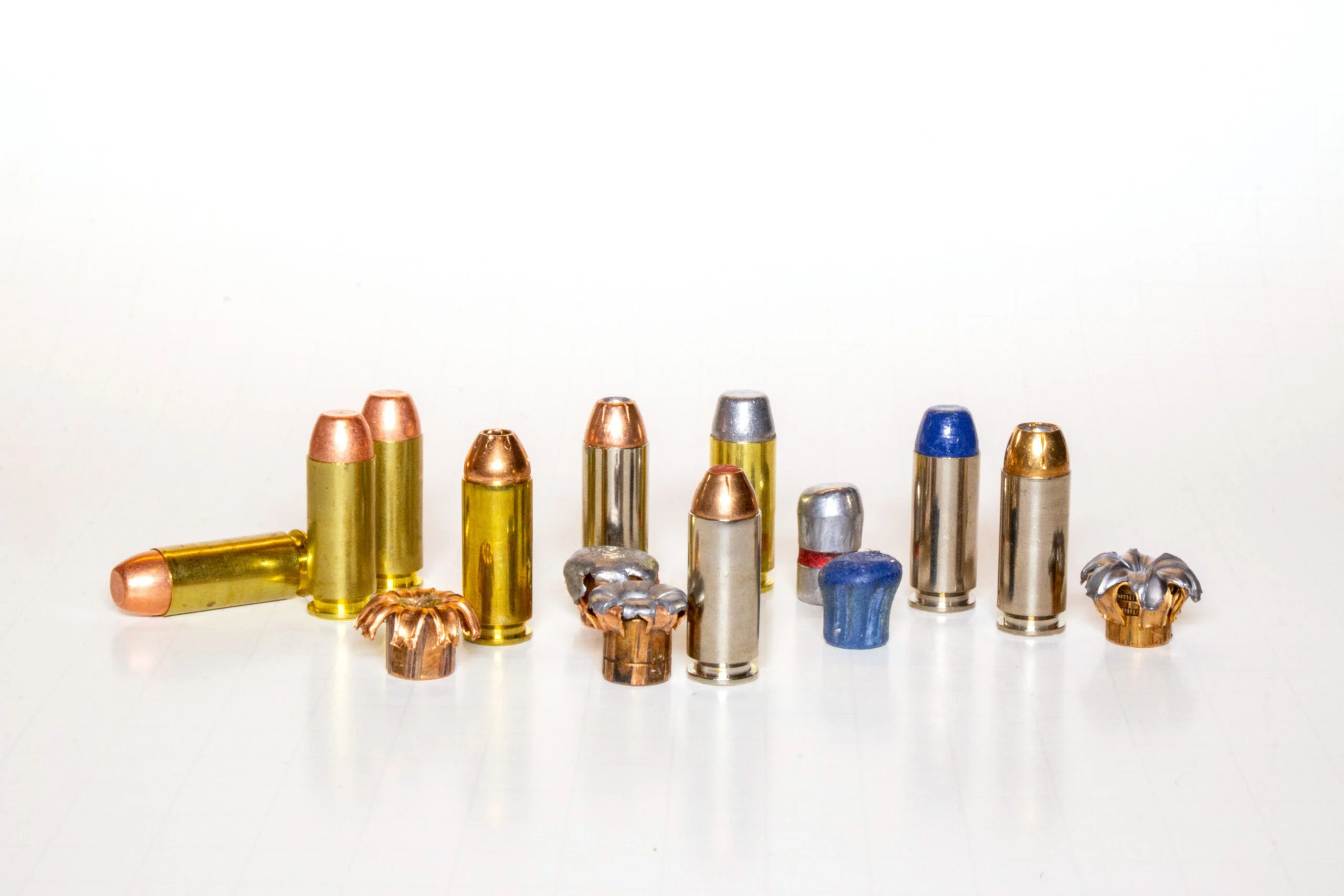
What To Consider When Choosing 10mm Ammo
A catchphrase in business is “location, location, location.” When it comes to buying ammo, the catchphrase should be “application, application, application.” You want to select ammunition that will provide you with the best chance of success based on what you are going to use the ammunition for. You would not consider using target ammo to stop a charging brown bear, and unless you’ve got buckets of money lying around, you’d not be wise to use expensive ammunition for training and practice.
When it comes time to select the ammunition you will use in your 10mm pistol, take a hard look at the application and then consider the terminal performance, recoil impulse, and the cost of the ammunition. Ultimately, just as with target shooting, shot placement will matter the most, but it’s always a good idea to stack the deck a bit in your favor with a load that will allow you to shoot well and that will deliver the best on-target performance available given the application.
FAQs
Q: Is 10mm more powerful than 40 cal?
It can be substantially more powerful. Common 40 S&W ammunition loaded with a 180-grain bullet will have a muzzle velocity of around 1000 fps. Some 10mm 180-grain loads can generate as much as 1300 fps. From an energy comparison, the hardest-hitting 10mm loads can be as much as 30 percent more powerful.
Q: What is the best quality 10mm ammo?
A definitive answer to this question is difficult because most major ammunition manufacturers make high-quality ammo. However, regardless of how you might measure it, Buffalo Bore and Federal ammunition will almost always be at the top.
Q: How much does a 10mm drop at 100 yards?
It depends on the load being shot, the barrel length of the handgun, and the muzzle velocity. With a common 10mm load using a 25-yard zero, you can expect between 9 to 12 inches of drop at 100 yards.
Final Thoughts
The main reason the 200-grain HST load was selected as the best overall is that if you must rely on one load for everything—except practice—its combination of 15 inches of penetration and bullet upset of nearly three-quarters of an inch offers the best balance of all the loads tested. And maybe that’s why this load costs so much. When hunters select hunting ammunition, they tend not to fret too much at the cost of ammo loaded with premium bullets. The same mindset should apply to any handgun ammunition that’s going to be used seriously.
Why Trust Us
For more than 125 years, Field & Stream has been providing readers with honest and authentic coverage of outdoor gear. Our writers and editors eat, sleep, and breathe the outdoors, and that passion comes through in our product reviews. You can count on F&S to keep you up to date on the best new gear. And when we write about a product—whether it’s a bass lure or a backpack—we cover the good and the bad, so you know exactly what to expect before you decide to make a purchase.

